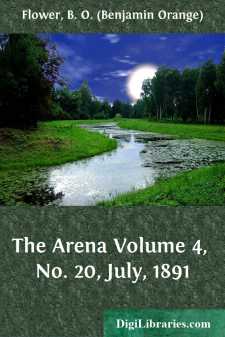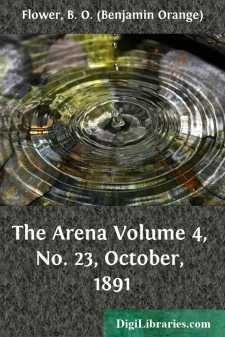Categories
- Antiques & Collectibles 13
- Architecture 36
- Art 48
- Bibles 22
- Biography & Autobiography 813
- Body, Mind & Spirit 142
- Business & Economics 28
- Children's Books 14
- Children's Fiction 11
- Computers 4
- Cooking 94
- Crafts & Hobbies 4
- Drama 346
- Education 46
- Family & Relationships 57
- Fiction 11829
- Games 19
- Gardening 17
- Health & Fitness 34
- History 1377
- House & Home 1
- Humor 147
- Juvenile Fiction 1873
- Juvenile Nonfiction 202
- Language Arts & Disciplines 88
- Law 16
- Literary Collections 686
- Literary Criticism 179
- Mathematics 13
- Medical 41
- Music 40
- Nature 179
- Non-Classifiable 1768
- Performing Arts 7
- Periodicals 1453
- Philosophy 64
- Photography 2
- Poetry 896
- Political Science 203
- Psychology 42
- Reference 154
- Religion 513
- Science 126
- Self-Help 84
- Social Science 81
- Sports & Recreation 34
- Study Aids 3
- Technology & Engineering 59
- Transportation 23
- Travel 463
- True Crime 29
The Arena Volume 4, No. 19, June, 1891
Categories:
Description:
Excerpt
History repeats itself, but on new planes. Often, a symbol appears in one age, and the spirit of which it is the expression is revealed in another. Each answers the need of its own time. From the creative standpoint, which is out of time, spirit and symbol are one; but to us, who see things successively, they seem as prior and posterior.
If this be so, it should be possible for a thoughtful and believing mind in some measure to forecast the future from the record of the past. No doubt, past and present contain the germs of all that is to be, were the analyst omniscient. But it needs not omniscience roughly to body-forth the contours of coming events. It is done daily, on a smaller or larger scale, with more or less plausibility. All theories are grounded in this principle. And it is noticeable that, at this moment, such tentative prophesies are more than frequent, and more comprehensive than usual in their scope.
The condition of mankind, during the last quarter of the fifteenth century, bore some curious analogies to its state at present. A certain stage or epoch of human life seemed to have run its course and come to a stop. The impulses which had started it were exhausted. In the political field, feudalism, originally beneficent, had become tyrannous and stifling; and monarchy, at first an austere necessity, had grown to be, beyond measure, arrogant, selfish, and luxurious. In science, the old methods had proved themselves puerile and inefficient, and the leading scientists were magicians and witches; in literature, no poet had arisen worthy to strike the lyre that Chaucer tuned to music. As for religion, the corruptions of the papacy, and the corresponding degradation of the monasteries and of the priesthood generally, had brought it down from a region of sublime and self-abnegating faith, to a commodity for raising money, and a cloak to hide profligacy. Martin Luther was still in the womb of the future; and so were Shakespeare, Bacon, Galileo, Descartes, and Oliver Cromwell. Pessimists were declaring, according to their invariable custom, that what was bad would get worse, and that what was good would disappear. But there were, scattered here and there throughout Christendom, a number of men of the profounder, optimistic tendency, who saw in existing abuses but the misuse or misapprehension of elements intrinsically good; who knew that evils bear in themselves the seeds of their own extirpation; and who believed that Providence, far from having failed in its design to secure the ultimate happiness of the human race, was bringing the old order of things to a close in order to provide place for something new and higher.
But that obstacle in the way of improvement which was apparently the most immovable, was the geographical one. The habitable earth was used up. Outside of Europe there was nothing, save inaccessible wilderness, and barren, boundless seas. There was nothing for the mass of men to do, and yet their energy and desire were as great as ever; there was nowhere for them to go, and yet they were steadily increasing in numbers. The Crusades had amused them for a while, but they were done with; the plague had thinned them out, and war had helped the plague; but the birth-rate was more than a match for both. A new planet, with all the fresh interests and possibilities which that would involve, seemed absolutely necessary....






